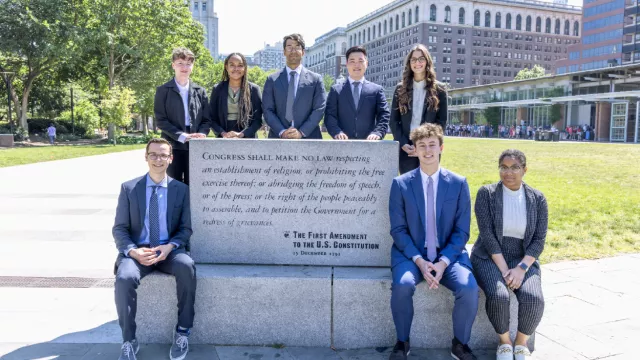Table of Contents
If no one is listening, does free speech make a sound?

Shutterstock.com
Manas Pandit is a rising junior at the University of Massachusetts Amherst and a FIRE summer intern.
Is free speech in a politically apathetic community truly free speech? This is a difficult question to think about, so let me provide a more tangible, personal answer.
I attend the University of Massachusetts Amherst, which receives a “Slightly Below Average” rating for its speech climate from FIRE. I’m also a columnist for the Massachusetts Daily Collegian, UMass Amherst’s campus newspaper. Countless times, I’ve told someone about my work for the newspaper and heard the same confused and somewhat impressed refrain: “We have a campus newspaper?”
Yes! And not only do we have one, but the Daily Collegian publishes hard-hitting criticism of the UMass Amherst administration.

That being said, one can hardly fault students for being unaware when newsstands on campus are few, far between, and empty at that (the Collegian stopped print circulation during the COVID-19 pandemic). The potential of the Collegian to enact social change is questionable if the student body is blissfully unaware of the publication’s existence.
It’s not just the newspaper either. The last time a protest took place on campus was in the fall of 2021, in response to a sexual assault allegation against a member of a fraternity. The protests quickly devolved into vandalism with windows being shattered and a car being set ablaze, but once passions died down, the issue was forgotten and regular campus life resumed. Since then, major political protest on campus has been sparse, even amid a climate of constant tuition hikes, negative administrative changes, and a national reckoning on social justice.
Simply put, a large number of students do not think or talk about politics much, if at all.

FIRE’s 2023 interns talk free speech, First Amendment cases, and FIRE
Each year, FIRE welcomes a cohort of undergraduate interns into its Philadelphia office for its summer intern program.
Counterintuitively, this state of affairs has allowed me to express my own opinions and expose myself to varied perspectives; the apathy surrounding politics at UMass Amherst has led to a lack of attempted censorship of opposing views.
Still, such indifference makes the potential impact of speech doubtful. A recent editorial in the Daily Collegian offered a more tangible example of this dilemma, noting that certain campus issues persist even after a torrent of columns dissecting them.
Free speech is often defended as a vehicle for social change, particularly at institutions of higher education. It spurs change first by informing, then by galvanizing, the public into action. But if the speech is witnessed by no one, this mechanism of action is lost. Speech is then simply a vehicle for an individual’s discovery and exposition of truth.
Perhaps this rationale for free speech holds up in an apathetic environment, but it can only go so far: One’s own discovery of truth is well and good, but to what end?
One answer to this challenge is that the freedom of expression provides a certain liberty and dignity to the individual, allowing them to truly realize themselves as a human being. This rationale works under conditions of political apathy, not only for those who choose to actively engage in political speech, but even for those who do not.
Apathy toward politics is nothing if not an expression of one’s disinterest; a form of speech to which a citizen or a community has every right, no matter how wrong others think it. And, like all expression, apathy is subject to criticism. The only remedy then is to work toward changing that attitude through our arguments.
Even if there are only a select few making those arguments within any given community, they are still capable of creating change.
Student publications are a student body’s instrument for free speech.
One possible method for a student publication to combat apathy is to first work on issues closer to the student body’s interests and develop a stronger base of support within the community, through which it may create recognition and concern for its political work, both on the campus and national level.
Bringing about such change may seem daunting, but the task of changing dominant opinion always is. Yet, all of history is the overthrow of consensus by opinions once thought fringe. This potential for change serves as motivation for student journalists and activists in apathetic environments.
Student publications are a student body’s instrument for free speech. Continuing the work of such publications, and striving to change campus culture to be more attentive to publications, is important: If these instruments are left unmanned in a time of political apathy, they will be unrecognizable in a time of political need.
Recent Articles
Get the latest free speech news and analysis from FIRE.

The federal charges against Don Lemon raise serious concerns for press freedom

The American people fact-checked their government

California prohibits its teachers from talking about a student's gender identity to their parents. That raises First Amendment concerns.


